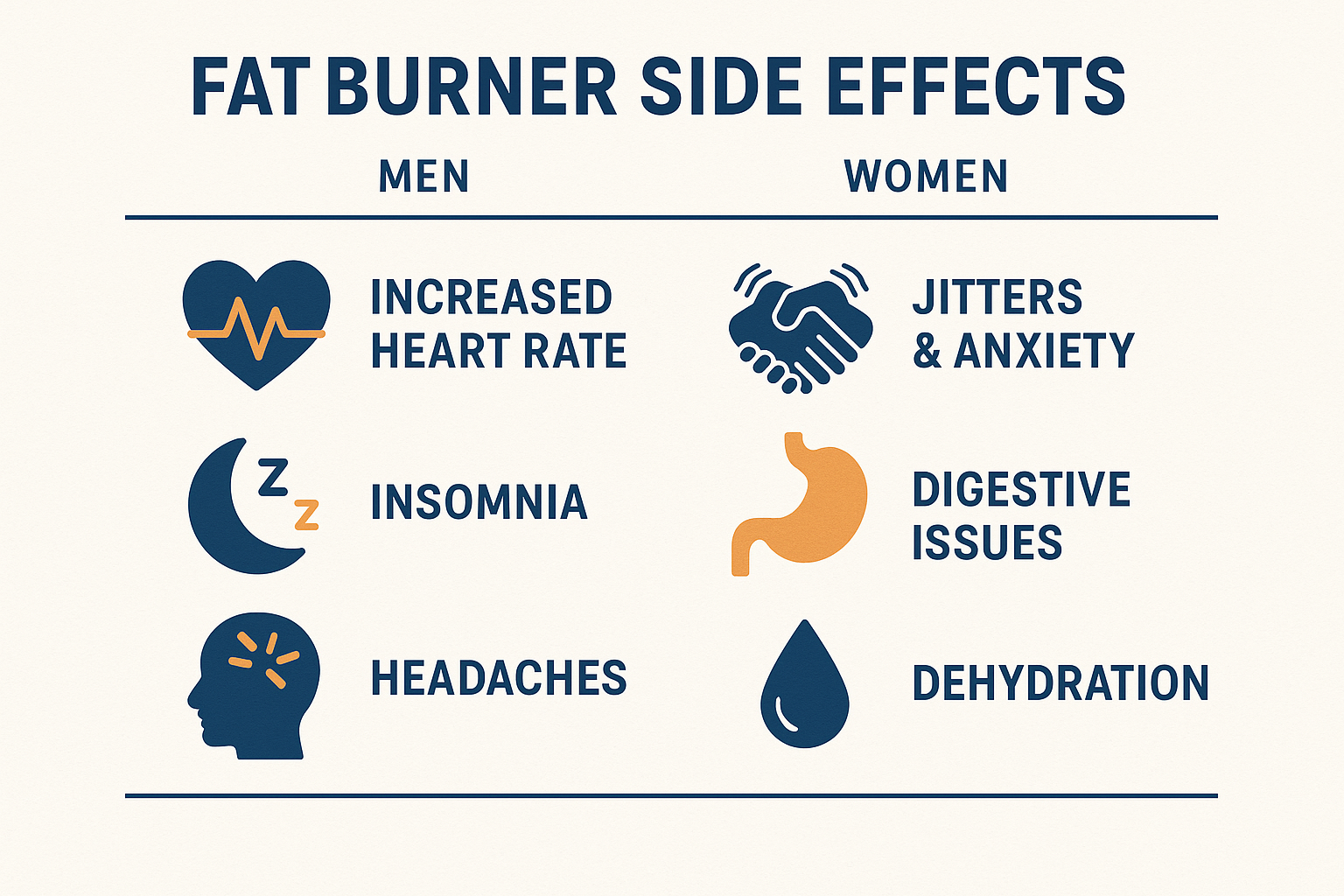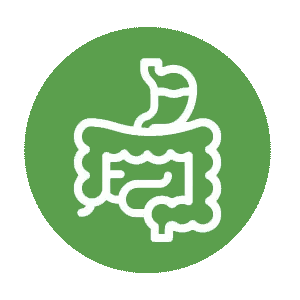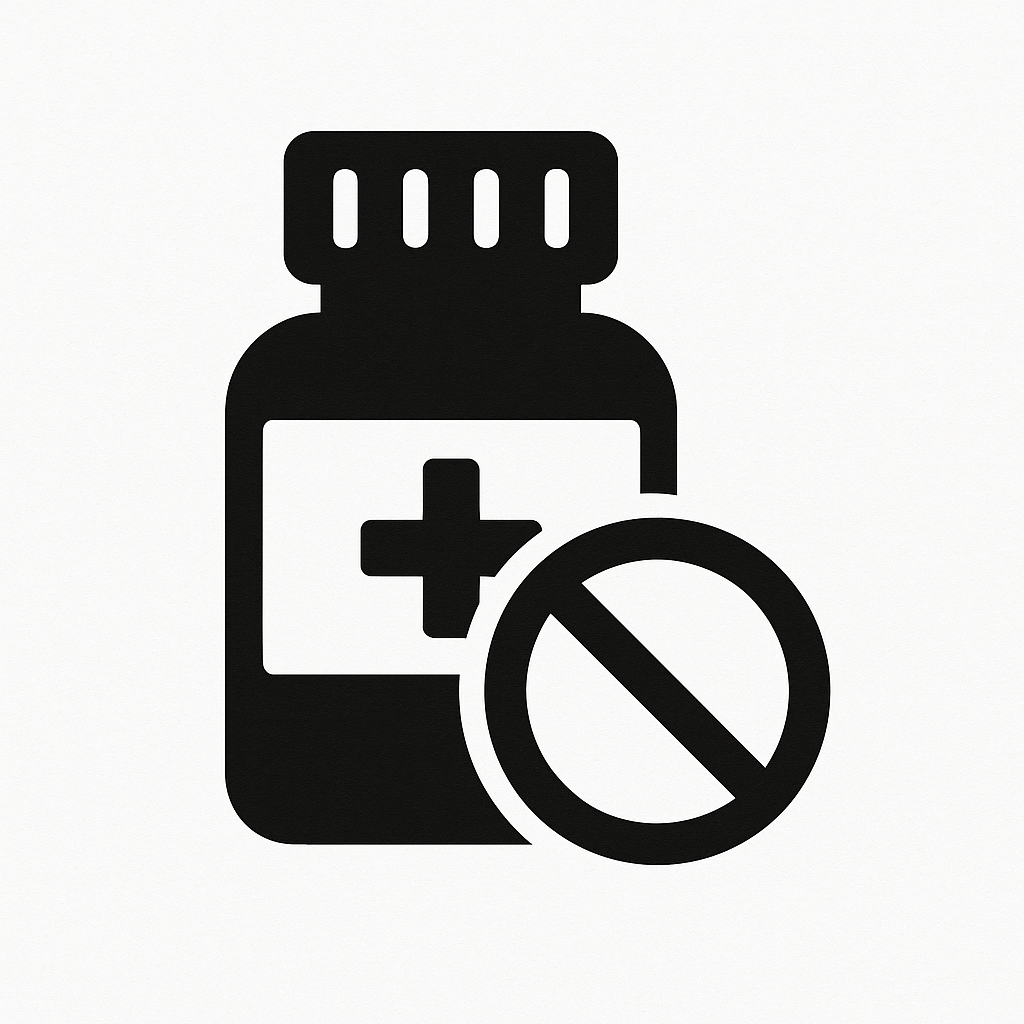
Fat Burner Side Effects For Men & Women You Must Know
The weight loss supplement industry generates billions in annual revenue, with fat burners representing one of the most popular categories. Advertisements promise dramatic results: shed pounds quickly, boost metabolism, burn fat while you sleep, and achieve your dream body without extreme effort. The appeal is undeniable, particularly in a society where quick fixes are prized over sustainable changes.
However, behind the glossy marketing and before-and-after photos lies a more complex reality. Fat burners can produce side effects ranging from mildly uncomfortable to genuinely dangerous, and these effects often differ between men and women due to physiological, hormonal, and metabolic differences. Understanding these potential consequences is essential before introducing any fat burner into your regimen.
This comprehensive guide examines the full spectrum of fat burner side effects, explores why men and women may experience different reactions, identifies the most problematic ingredients, and offers evidence-based alternatives for those seeking safe, sustainable weight management solutions.
Understanding Fat Burners: What Are They?
Fat burners are dietary supplements designed to accelerate weight loss through various mechanisms. They typically work by increasing metabolism and energy expenditure, suppressing appetite and reducing caloric intake, enhancing fat oxidation and utilization, increasing thermogenesis (heat production in the body), or blocking fat or carbohydrate absorption.
These products contain diverse ingredients including stimulants like caffeine and synephrine, herbal extracts such as green tea and garcinia cambogia, amino acids like L-carnitine, minerals such as chromium, and various proprietary blends with undisclosed proportions.
The critical issue is that the supplement industry operates with far less regulatory oversight than pharmaceutical drugs. Manufacturers aren't required to prove efficacy or safety before marketing products, and the actual contents may differ from label claims. This regulatory gap creates significant risks for consumers who assume "natural" or "herbal" automatically means safe.
Common Side Effects: What Most Users Experience
Even "mild" side effects can significantly impact daily life and overall health. Understanding the most frequently reported reactions helps you recognize warning signs if they occur.
Cardiovascular Effects
The most common side effects relate to cardiovascular function. Increased heart rate and palpitations occur because stimulants in fat burners activate the sympathetic nervous system. Many users report feeling their heart "racing" or experiencing irregular heartbeats that can be alarming, particularly during exercise or stress.
Elevated blood pressure is another widespread concern. Stimulants cause blood vessels to constrict, increasing pressure against arterial walls. While this may seem minor, consistently elevated blood pressure strains the cardiovascular system and increases risk for heart attack and stroke, particularly in individuals with preexisting conditions.
Chest discomfort, ranging from tightness to sharp pains, causes anxiety and may signal cardiovascular stress. While often benign, distinguishing between supplement-induced discomfort and genuine cardiac events requires medical evaluation.
Nervous System Effects
Fat burners profoundly affect the nervous system, producing effects that impact daily functioning. Jitteriness and tremors occur as stimulants overstimulate motor neurons, causing involuntary muscle movements. This can interfere with fine motor tasks and feels deeply uncomfortable.
Anxiety and restlessness develop as stimulants activate stress response pathways. Users describe feeling "wired," unable to relax, or experiencing racing thoughts. For individuals predisposed to anxiety disorders, fat burners can trigger or exacerbate symptoms significantly.
Sleep disturbances represent one of the most debilitating side effects. Difficulty falling asleep, frequent waking, reduced sleep quality, and early morning awakening leave users exhausted despite taking supplements supposedly designed to boost energy. The irony is cruel—poor sleep undermines weight loss efforts by disrupting hormones that regulate appetite and metabolism.
Headaches, ranging from mild tension to severe migraines, affect many users. These may result from caffeine effects, dehydration, blood pressure changes, or withdrawal when skipping doses.
Gastrointestinal Issues
Digestive problems plague many fat burner users. Nausea and upset stomach occur frequently, particularly when supplements are taken on an empty stomach as often recommended. Diarrhea results from ingredients that accelerate gut motility or aren't well absorbed. Constipation paradoxically affects some users due to dehydration or specific ingredients like calcium.
Abdominal cramping and discomfort can be severe enough to interfere with work and daily activities. Some ingredients irritate the gastrointestinal lining, potentially causing longer-term digestive issues.
Metabolic and Hormonal Effects
Increased body temperature and sweating occur as thermogenic ingredients raise core temperature. While this indicates increased calorie burning, excessive sweating can be socially uncomfortable and lead to dehydration.
Dehydration develops from multiple mechanisms: increased sweating, diuretic effects of certain ingredients, reduced thirst awareness, and caffeine's mild diuretic properties. Chronic dehydration impairs physical performance, cognitive function, and metabolic processes.
Psychological Effects
Mood swings, irritability, and emotional instability affect many users as stimulants and metabolic changes influence neurotransmitter systems. The "crash" after stimulant effects wear off can be particularly challenging.
Difficulty concentrating and brain fog paradoxically affect some users despite stimulants theoretically enhancing focus. This may result from overstimulation, poor sleep, or metabolic imbalances.
Serious and Dangerous Side Effects
Beyond common discomforts lie genuinely dangerous reactions that can cause lasting harm or even death. These serious side effects demand immediate medical attention and often result in permanent discontinuation of fat burners.
Cardiovascular Emergencies
Heart attack and stroke risk increases significantly with certain fat burner ingredients, particularly in individuals with preexisting cardiovascular conditions or risk factors. Stimulants cause prolonged elevation of heart rate and blood pressure, increased blood clotting tendency, arterial constriction, and abnormal heart rhythms.
Arrhythmias (irregular heartbeats) can be life-threatening. Atrial fibrillation, ventricular tachycardia, and other dangerous rhythms may develop, particularly when fat burners are combined with other stimulants or during intense exercise.
Liver Damage
Hepatotoxicity (liver damage) represents one of the most serious risks, particularly with products containing green tea extract in high concentrations, usnic acid, or certain proprietary blends. Symptoms include jaundice (yellowing of skin and eyes), dark urine, light-colored stools, severe fatigue, abdominal pain in the upper right quadrant, and unexplained nausea.
Cases of acute liver failure requiring transplantation have been documented with various fat burner products. The liver damage mechanism isn't always clear but may involve direct toxicity, immune reactions, or metabolic overload.
Seizures
Certain stimulants, particularly bitter orange extract (synephrine) in high doses and proprietary stimulant blends, can lower seizure threshold and trigger convulsions even in individuals without epilepsy history.
Psychiatric Emergencies
Severe anxiety, panic attacks, psychosis, and manic episodes have been reported with high-dose stimulant fat burners. These psychiatric emergencies may require hospitalization and can have lasting psychological impacts.
Serotonin Syndrome
When fat burners containing serotonergic compounds are combined with antidepressants or other medications affecting serotonin, a potentially fatal condition called serotonin syndrome can develop. Symptoms include agitation, confusion, rapid heart rate, high blood pressure, dilated pupils, muscle rigidity, and hyperthermia.
Kidney Damage
Dehydration, protein breakdown products, and certain ingredients can stress kidneys, potentially causing acute kidney injury or exacerbating chronic kidney disease. This risk increases significantly during intense exercise while using fat burners.
Gender-Specific Side Effects
Men and women experience fat burner side effects differently due to physiological and hormonal distinctions. Understanding these gender-specific reactions is crucial for risk assessment.
Side Effects More Common in Women
Women face unique vulnerabilities to certain fat burner effects. Menstrual cycle disruptions including irregular periods, heavy bleeding, or amenorrhea (absence of periods) occur when fat burners interfere with the hypothalamic-pituitary-ovarian axis. Extreme calorie restriction combined with stimulants can shut down reproductive function.
Hormonal imbalances may develop as fat burners affect estrogen and progesterone production and metabolism. These imbalances contribute to mood changes, skin problems, and fertility issues.
Thyroid dysfunction, particularly hypothyroidism, occurs more frequently in women. Some fat burner ingredients interfere with thyroid hormone production or conversion, potentially triggering or worsening thyroid problems.
Bone density concerns emerge because fat burners that suppress appetite drastically may reduce calcium and vitamin D intake, while hormonal disruptions can accelerate bone loss. Women already face higher osteoporosis risk, making this particularly problematic.
Anxiety and mood disorders affect women at higher baseline rates, and stimulant fat burners can significantly exacerbate these conditions. Women report more severe anxiety, panic attacks, and emotional instability with fat burner use.
Side Effects More Common in Men
Men face distinct risks with fat burner supplementation. Testosterone suppression can occur with extreme calorie restriction and certain supplement ingredients. While fat burners don't directly block testosterone, the metabolic stress they create can reduce production.
Erectile dysfunction may develop through multiple mechanisms: cardiovascular effects impairing blood flow, hormonal changes affecting sexual function, psychological stress and anxiety, and dehydration reducing overall physiological function.
Gynecomastia (breast tissue development) can result from hormonal imbalances caused by fat burners, particularly when combined with other supplements or extreme dieting affecting estrogen-testosterone ratios.
Prostate concerns may worsen in men with benign prostatic hyperplasia (BPH), as some stimulants can exacerbate urinary symptoms. Additionally, the cardiovascular strain from fat burners may be particularly problematic for men with higher baseline cardiovascular risk.
Aggression and mood changes in men often manifest as irritability and anger rather than anxiety. The "roid rage" phenomenon isn't limited to anabolic steroids—stimulant-induced mood changes can be significant.
Dangerous Ingredients to Avoid
Certain ingredients pose disproportionate risks and should be avoided entirely. Understanding what to look for on labels protects you from the most hazardous compounds.
DMAA (1,3-Dimethylamylamine)
This powerful stimulant was banned by the FDA but occasionally appears in products sold online or internationally. DMAA causes severe cardiovascular effects including heart attack, stroke, and sudden death. It was originally developed as a nasal decongestant but was never approved for consumption.
DMHA (Octodrine)
Often marketed as a DMAA replacement, DMHA poses similar cardiovascular risks. It's structurally similar to amphetamines and produces dangerous stimulant effects.
Ephedra/Ephedrine
Banned in the United States since 2004 after numerous deaths, ephedra occasionally appears in international products. It causes severe cardiovascular complications, strokes, seizures, and psychiatric problems.
Synephrine (Bitter Orange) in High Doses
While lower doses may be relatively safe, high concentrations of synephrine—particularly when combined with caffeine—produce effects similar to ephedra. Products containing more than 30mg synephrine warrant caution.
Usnic Acid
This compound, derived from lichen, has been associated with severe liver damage. Despite being "natural," it's hepatotoxic and has caused liver failure requiring transplantation.
Excessive Caffeine
While caffeine itself isn't inherently dangerous at moderate doses, many fat burners contain 300-500mg or more per serving—equivalent to four or five cups of coffee. This excessive amount, particularly when combined with other stimulants, causes severe side effects.
Proprietary Blends
Products listing "proprietary blends" without disclosing individual ingredient amounts pose serious risks. You cannot assess dosages or identify problematic ingredients, making these products particularly dangerous.
Yohimbine in High Doses
This alpha-2 antagonist can effectively support fat loss but causes significant side effects at high doses including anxiety, hypertension, rapid heartbeat, and panic attacks. It's particularly risky for individuals with anxiety disorders or cardiovascular conditions.
Drug Interactions and Contraindications
Fat burners can interact dangerously with medications and are contraindicated in numerous health conditions. These interactions can amplify side effects or reduce medication effectiveness, creating serious health risks.
Medication Interactions
Antidepressants, particularly MAO inhibitors and SSRIs, can cause life-threatening serotonin syndrome when combined with certain fat burner ingredients. Blood pressure medications may be overwhelmed by stimulant effects, causing dangerous spikes. Diabetes medications combined with appetite suppressants can cause dangerous blood sugar fluctuations. Stimulant medications for ADHD create excessive stimulation when added to fat burners. Blood thinners interact with various herbal ingredients affecting clotting.
Medical Contraindications
Cardiovascular disease of any kind represents an absolute contraindication for stimulant fat burners. High blood pressure, even if controlled with medication, creates significant risk. Anxiety disorders, panic disorder, and psychiatric conditions are often severely worsened. Liver or kidney disease prevents safe metabolism and elimination of ingredients. Thyroid disorders can be exacerbated by metabolic manipulations. Pregnancy and breastfeeding are absolute contraindications—never use fat burners during these periods.
Safer Alternatives for Weight Management
Effective weight loss doesn't require dangerous supplements. Evidence-based alternatives offer sustainable results without severe side effects.
Natural Metabolism Support
Green tea (moderate amounts) provides gentle thermogenic effects and antioxidants without extreme stimulation. Aim for 2-3 cups daily rather than concentrated supplements. Protein optimization through adequate intake (0.7-1 gram per pound body weight) increases metabolism through the thermic effect of food and preserves muscle during weight loss.
Strength training builds metabolically active muscle tissue that burns calories at rest. This approach creates lasting metabolic improvements rather than temporary stimulation. High-intensity interval training (HIIT) creates an "afterburn effect" where metabolism remains elevated after exercise, supporting fat loss without supplements.
Appetite Management Strategies
Fiber-rich foods increase satiety and regulate blood sugar, naturally reducing calorie intake. Prioritize vegetables, fruits, legumes, and whole grains. Adequate protein at each meal supports satiety more effectively than appetite suppressant supplements. Mindful eating practices including eating slowly, recognizing hunger and fullness cues, and eliminating distractions during meals naturally reduce overconsumption.
Adequate hydration helps distinguish between hunger and thirst and supports metabolic function. Often, perceived hunger is actually dehydration. Sleep optimization regulates hunger hormones (ghrelin and leptin) more effectively than any supplement. Prioritize 7-9 hours nightly.
Hormonal Balance Approaches
Stress management through meditation, yoga, nature time, or other relaxation practices reduces cortisol that promotes fat storage. Circadian rhythm maintenance by consistent sleep-wake times, morning light exposure, and reduced evening blue light optimizes hormonal patterns supporting healthy body composition.
Nutrient density ensures adequate vitamins and minerals supporting metabolic processes without requiring dangerous supplements. Focus on colorful vegetables, quality proteins, healthy fats, and whole food carbohydrates.
Evidence-Based Supplements
If supplementation appeals to you, certain options offer support with minimal risk. Omega-3 fatty acids support metabolic health and reduce inflammation without stimulant effects. Vitamin D deficiency correlates with difficulty losing weight, and supplementation may support efforts in deficient individuals. Probiotics support gut health, which influences metabolism and body composition. Magnesium supports numerous metabolic processes and improves sleep quality, indirectly supporting weight management.
Making Informed Decisions
If considering fat burners despite risks, minimize danger through informed decision-making.
Consultation and Disclosure
Always discuss supplement plans with your healthcare provider before starting, particularly if you have medical conditions or take medications. Full disclosure about all supplements prevents dangerous interactions.
Product Research
Choose products from reputable manufacturers with third-party testing certification (like NSF, USP, or Informed Choice). Avoid proprietary blends without disclosed ingredient amounts. Research individual ingredients and dosages. Start with minimal doses to assess tolerance. Never exceed recommended serving sizes seeking faster results.
Monitoring and Discontinuation
Track side effects carefully, noting even mild symptoms. Monitor blood pressure and heart rate regularly. Watch for warning signs like chest pain, severe headaches, psychological changes, or gastrointestinal symptoms. Discontinue immediately if serious side effects develop and seek medical attention. Don't restart after serious reactions.
Sustainable Weight Loss: The Real Solution
The uncomfortable truth about fat burners is that they don't address the fundamental behaviors and patterns that lead to sustainable weight loss. Even if they produce short-term results, stopping them typically leads to regaining weight because underlying habits haven't changed.
True, lasting weight loss comes from moderate caloric deficit that's sustainable long-term, regular physical activity you enjoy and can maintain, adequate protein to preserve muscle mass, whole food nutrition emphasizing nutrient density, quality sleep supporting hormonal balance, stress management preventing cortisol-driven weight gain, and behavioral changes creating new, healthier patterns.
These approaches lack the excitement of quick-fix supplements, but they work consistently, improve overall health beyond weight, create lasting change rather than temporary results, avoid dangerous side effects, and cost less than continual supplement purchases.
Your Path to Healthy Weight Management
Understanding fat burner side effects empowers you to make informed decisions aligned with your health priorities. While the appeal of rapid results is strong, protecting your health must remain paramount. The cardiovascular, hepatic, psychological, and hormonal risks associated with many fat burners simply aren't worth marginal weight loss acceleration.
If you're committed to supporting your weight management journey with supplements, choose evidence-based options designed with safety as a priority. Quality products formulated with appropriate ingredient dosages, transparency about contents, and support for sustainable approaches offer benefits without extreme risks.
Remember that successful weight management is a marathon, not a sprint. The most effective approach is one you can maintain long-term without compromising your health, relationships, or quality of life.
Discover Safe Weight Management Solutions
If you're seeking effective support for your weight management goals without dangerous stimulants or extreme formulations, explore science-backed options designed with both efficacy and safety in mind. Quality supplements that support metabolism naturally, provide essential nutrients, and complement healthy lifestyle choices can be valuable tools in your wellness journey.
Visit Matevara's Weight Management & Metabolism Collection to discover thoughtfully formulated products that prioritize your health while supporting your goals.
Choose wisely. Your health is worth it.
Disclaimer: This article is intended for informational and educational purposes only and should not be construed as medical advice, diagnosis, or treatment recommendations. The information provided about fat burner supplements, their side effects, potential risks, and alternatives is based on available research and general health principles, but individual responses to supplements vary significantly based on personal health status, genetics, medications, and other factors. Always consult with qualified healthcare providers, including your physician or registered dietitian, before starting any new supplement regimen, weight loss program, or making significant changes to your diet or exercise routine. This consultation is particularly critical if you have preexisting medical conditions, take prescription medications, have a history of eating disorders, or are pregnant or breastfeeding. The statements about specific supplements, ingredients, and their effects have not been evaluated by the Food and Drug Administration, and the products discussed are not intended to diagnose, treat, cure, or prevent any disease. This article does not endorse the use of fat burners and presents information about risks to help readers make informed decisions. If you experience any adverse effects from supplements, discontinue use immediately and seek medical attention. Emergency symptoms including chest pain, difficulty breathing, severe headache, signs of liver damage, or psychiatric disturbances require immediate emergency medical care. Weight loss and supplement decisions should be made in partnership with healthcare professionals who can evaluate your individual circumstances, monitor for complications, and provide personalized recommendations based on your specific health profile. This article cannot replace personalized medical advice tailored to your unique situation.
Share








